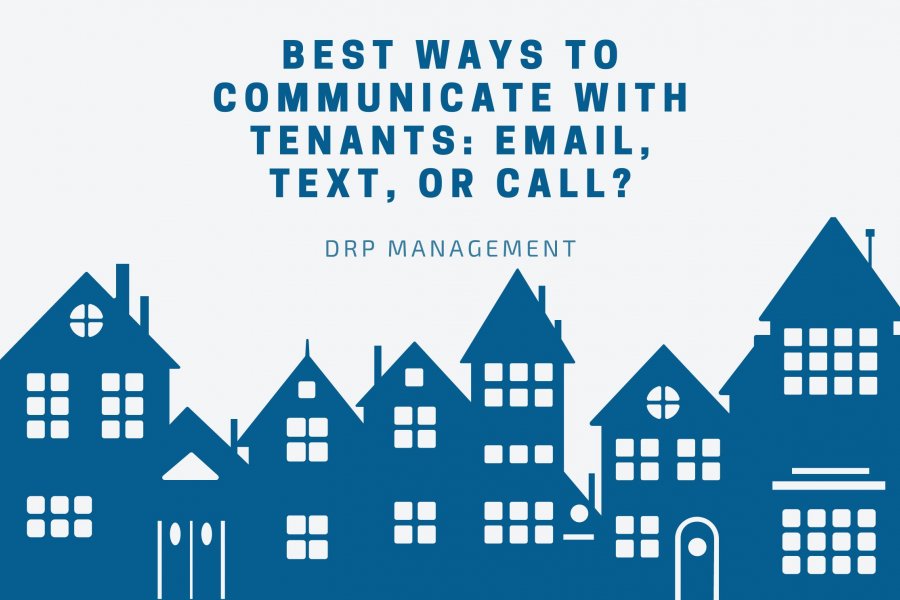
At DRP Management, we’ve helped thousands of homeowners across DC and Northern VA. Over the years, we’ve learned that the key to stress-free and long-term tenancies is to keep open lines of communication between landlords and tenants.
When a landlord communicates with renters from the beginning, it’s less likely for issues and misunderstandings to unravel. Additionally, this can make tenants feel more welcome in a rental, which often leads to longer tenancies or renewed leases.
While keeping open lines of communication with your renters is crucial, the way you communicate with them matters. After all, there’s a time and place for texts, emails, and phone calls. If you don’t know what’s the best way to communicate with your tenants, don’t worry! In this article, we’ll tell you whether you should email, text, or call renters depending on the situation.
Why Is It Important to Communicate with Tenants?
Effective communication between landlords and tenants has many benefits, including:
Building trust. If your tenants can easily contact you, they’ll feel that their concerns and requests are being heard and addressed. In the long run, this can help you build a long-lasting relationship with them.
- Reduce vacancies. Tenants who think that their landlord is responsive and attentive are less likely to leave. Plus, if your rental is vacant, adding your contact information to your property listing can help you attract more tenants.
- Happier tenants. Good communication can help you avoid misunderstandings and improve tenant satisfaction.
- Saving money. By keeping open lines of communication with your renters, you can always be aware of any issues in your rental. This can help you attend to problems before they turn into costly repairs.

The best part is that communicating with your tenants doesn’t have to be complicated. A simple text or a short call often goes a long way!
Emailing Tenants: When and How to Do It
Emails are great for sharing that’s important but not too urgent, such as upcoming renovations. The benefit of this communication method is that it allows you to store every interaction.
This can come in handy when sending tenants reminders. For instance, if a tenant hasn’t paid rent and claims they forgot about it, you can show them the email you sent them to remind them and even charge them late payment fees.
When emailing tenants, remember to:
- Avoid sending incomplete emails.
- Draft every email with a clear purpose in mind.
- Include contact information at the bottom of each email.
- Double-check to ensure that any necessary attachments are sent.
- Send or schedule emails to be sent during business hours.
In many states, emails may be considered legal written documentation. So, it’s best to avoid sending over email things such as move-out notices, lease violation notices, or eviction notices.
Calling Tenants: When and How to Do It
Although younger tenants tend to prefer texts over phone calls, ringing up your tenants is sometimes the best option.

Phone calls are the best method of communication in situations where you need a fast response or can’t have misunderstandings, such as:
- Emergencies. If your tenants inform you of an emergency repair, a call can help you get a better rundown of the situation. Plus, it allows you to inform tenants of how you’ll deal with the problem.
- Courtesy reminders. When you schedule a property inspection or a repair, it’s best to give tenants a call to remind them you’re coming over. This can help you avoid misunderstandings.
- Inquiries. Whenever you need more in-depth information it is best to call tenants. This will help you avoid miscommunications and ensure you get all the information you need.
When calling tenants, it’s important to stick to business hours. After all, no one wants to receive a call from their landlord in the middle of the night. Also, make sure to keep things professional. Keep the call brief and state the purpose of your call upfront. Finally, if a tenant doesn’t answer your call, make sure to leave a detailed voicemail. This will increase the likelihood of them calling you back.
Texting Tenants: When and How to Do It
Texting is one of the best ways to communicate with renters because of how little time-consuming it is. For many people, replying to a text is easier than replying to an email or a missed call. So, when you text tenants, you can rest assured that they’ll get your message.
We recommend texting tenants when you need to give them short messages, like letting them know you’ll be out of town for the weekend. It’s also a great way to send reminders for things like payment due dates or scheduled property inspections.

While text messages are a simple and efficient way to communicate with tenants, it’s important to remember that constant and non-business-related texts can become annoying. To avoid problems, be sure to keep the following things in mind when texting tenants:
Get their permission. Ask tenants if they’re okay with you texting them occasionally. To avoid future misunderstandings, try to get their agreement in writing.
- Set the frequency of texting. Let tenants know for what and how often you will text them. To avoid spamming them, try to limit your communication via text message to only important matters.
- Don’t send random texts. Every text you send should be business-related. Texting tenants a picture of your last vacation won’t be appreciated on most occasions.
- Set texting guidelines for tenants. Just as you need to keep your texts professional, it’s crucial to limit what information a tenant can text you. As unnecessary or repetitive texts can distract you from other important affairs.
- Avoid texting about serious topics. Critical topics, such as late rent notices or lease terminations, should never be discussed over texts. Instead, these topics should be addressed over a formal letter or phone call to avoid misunderstandings.
Bottom Line
Nowadays, there are many ways you can communicate with your tenants. But each method of communication has its time and place. Texts are great for when you need a quick response.
Phone calls and emails, on the other hand, are better for discussing more serious matters. Now that you know when it’s best to email, text, or call, you can start improving your communication with your renters!
Do you want to learn more about how to effectively communicate with tenants? Then, contact DRP Management today! Our team can help you ensure that your property and your tenants are properly cared for at all times.
